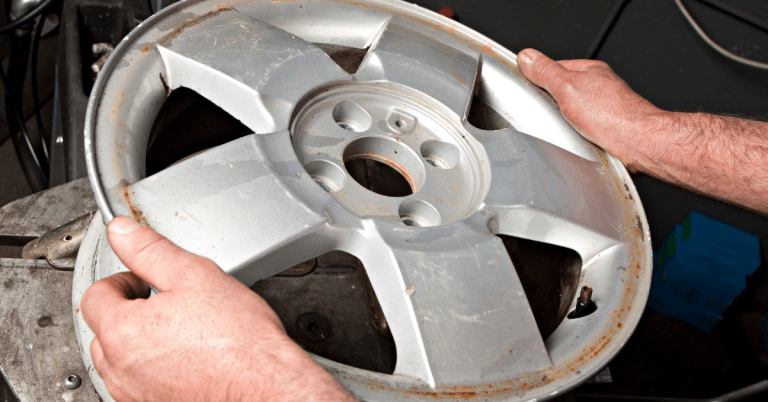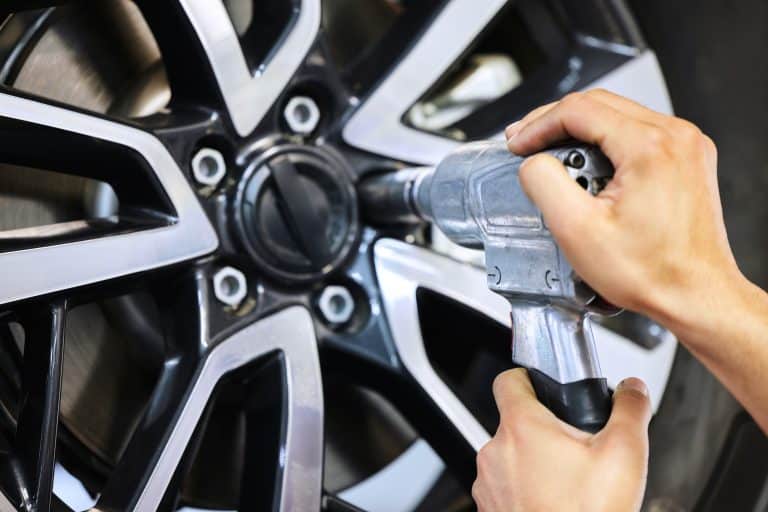When your wheels get damaged, you face a tough choice. Should you get alloy wheel refurbishment or buy new ones? The answer depends on several factors, but one thing is clear: making the right decision can save you hundreds of pounds.
Every driver will face this situation at some point. Whether it’s a kerb scrape whilst parking, hitting a pothole, or general wear and tear, wheel damage is part of car ownership. The good news is that most damage doesn’t require expensive replacement. Professional alloy wheel refurbishment can restore your wheels to like-new condition for a fraction of the cost.
The Bottom Line: Refurbishment Wins on Cost
Alloy wheel refurbishment typically costs between £60 and £130 per wheel, whilst new wheels can cost anywhere from £150 to over £500 per wheel, depending on size, brand, and finish. For a complete set of four wheels, you’re looking at £240-£520 for refurbishment versus £600-£2,000 for replacement.
This means alloy wheel refurbishment can save you between 60-75% compared to buying new wheels. These savings become even more significant when you consider that quality refurbishment work comes with warranties – at Alloy Fix, we offer a 3-year guarantee.
Understanding Wheel Damage Types
Before deciding between alloy wheel refurbishment and replacement, you need to understand what type of damage you’re dealing with. At Alloy Fix, we see three main types of damage:
Minor Surface Damage This includes light scratches, scuffs, and kerb damage on your wheels. These cosmetic issues don’t affect your wheel’s strength but can make your car look tired and reduce its value. Most surface damage to the damaged area can be completely fixed with standard alloy wheel refurbishment techniques.
Moderate Damage A buckled wheel refers to one that has become warped or deformed, usually due to hitting something hard. This type of damage can cause vibrations whilst driving and affect vehicle handling. The damaged area might not be visible to the naked eye, but you’ll feel it when driving.
Severe Damage A cracked wheel has developed a fracture or split in its structure. Cracks are serious safety issues that can lead to tyre failure if not addressed properly. When the damaged area includes structural cracks, professional assessment is essential.
When Alloy Wheel Refurbishment Makes Financial Sense
Alloy wheel refurbishment is almost always the cheaper option for minor to moderate damage. Modern refurbishment techniques can fix most problems you’ll encounter, from surface scratches to more complex issues.
The process works by carefully removing the damaged area through sanding and professional repair techniques. Each wheel is assessed individually to determine the best approach for that specific damaged area. Here’s what different types of alloy wheel refurbishment cost:
Standard Powder Coating Powder coating gives your wheels a durable, uniform finish that’s highly resistant to chips, scratches, and fading. This type of alloy wheel refurbishment typically costs £60-£80 per wheel. The process involves applying a dry powder electrostatically and then curing it under heat, creating a hard, protective surface.
Diamond Cut Finish Diamond-cut alloy wheel refurbishment requires specialist equipment and skilled technicians. The damaged area is precisely machined using a lathe that removes a thin layer of material from the wheel surface. The average cost of diamond cut alloy wheel refurbishment is about £115 per wheel, but the results are spectacular.
Specialist Repairs Even complex repairs like crack welding and wheel straightening through alloy wheel refurbishment are often cheaper than replacement. You can expect to pay upwards of £80 for crack welding, depending on the size and location of the damaged area.
The True Cost of Buying New Wheels
When thinking about replacement, many people only look at the basic wheel price. But the real cost of new wheels includes several hidden extras that quickly add up:
- Basic wheel cost: £150-£500+ per wheel
- Tyre fitting and balancing: £15-£30 per wheel
- New valve replacement: £5-£10 per wheel
- Disposal of old damaged wheels: £10-£20
- Potential colour matching issues if replacing only one wheel
These extras can add £120-£240 to your total replacement bill. Compare this to alloy wheel refurbishment, where the quoted price typically includes everything: repair of the damaged area, refinishing, and professional completion.
Real-World Cost Comparison Examples
Let’s look at some real examples to show the savings from alloy wheel refurbishment:
Example 1: Minor Kerb Damage
- Alloy wheel refurbishment: £75 per wheel
- New wheel (mid-range): £200 per wheel + £25 fitting
- Savings: £150 per wheel
Example 2: Four-Wheel Diamond Cut Refurbishment
- Alloy wheel refurbishment: £115 x 4 = £460
- New diamond cut wheels: £300 x 4 = £1,200 + £100 fitting
- Savings: £840 total
Example 3: Cracked Wheel Repair
- Alloy wheel refurbishment (welding + refinish): £120
- New wheel: £250 + £25 fitting
- Savings: £155
These examples show typical savings, but your costs might be different depending on your specific wheels and the extent of the damaged area.
Quality and Durability: Will Refurbished Wheels Last?
One common worry about alloy wheel refurbishment is whether it lasts as long as buying new wheels. The answer depends on the quality of work, but professional refurbishment can match or exceed the lifespan of new wheels.
At Alloy Fix, we’re so confident in our alloy wheel refurbishment that we offer a 3-year warranty on all powder coating and diamond cut services. This is longer than many new wheel warranties and shows our confidence in the repair of each damaged area.
Quality alloy wheel refurbishment uses the same materials and techniques as original manufacturing. Powder coating, for example, creates a finish that’s often more durable than the original factory coating.
When You Might Need to Replace Your Wheels
While alloy wheel refurbishment fixes most problems, there are times when buying new wheels is the only safe choice:
Major Structural Problems If your wheels have multiple cracks or severe damage to the main structure, replacement is essential. A damaged area that affects the wheel’s strength can’t always be safely repaired. Aluminium wheels aren’t as bendy as steel ones, so they may break if you try to reshape them.
Very Old or Heavily Corroded Wheels Sometimes wheels are so old or rusty that refurbishment isn’t worth it. If the damaged area covers most of the wheel surface, or if there’s deep corrosion throughout, replacement might cost less overall.
Matching Problems If you need to replace just one wheel and can’t find an exact match, you might need to buy a pair or even a full set. This is especially true for older or unusual wheel designs.
How to Choose: Making the Right Decision
The choice between alloy wheel refurbishment and replacement comes down to three main things: cost, safety, and how you want your car to look.
For Minor Damage If your wheels have scratches, scuffs, or small damaged areas, refurbishment is almost always your best choice. These problems can be completely fixed for much less money than buying new.
For Medium Damage
Bent or buckled wheels need expert assessment. Our team fixes up to 99% of all buckles and welds, so even badly damaged wheels can often be saved. The damaged area might look terrible, but it can usually be repaired.
For Serious Damage Safety comes first, always. If there’s any doubt about whether your wheels are safe after repair, replacement is the only choice. We’ll always give you honest advice about what’s safe.
Why Choose Alloy Fix for Your Refurbishment
At Alloy Fix, we make alloy wheel refurbishment the obvious choice by offering:
3-Year Warranty We guarantee all our refurbishment work for three years. This shows we believe in the quality of our repairs to every damaged area.
Expert Assessment
We’ll honestly tell you if alloy wheel refurbishment is safe and cost-effective for your situation. If replacement is safer, we’ll recommend that instead.
Loan Wheels Available You can keep driving whilst we work on your wheels. We provide temporary wheels so you’re not stuck without transport.
Professional Equipment We use the same quality materials and equipment as the original manufacturers. Each damaged area gets professional treatment using industry-standard techniques.
Frequently Asked Questions
How long does alloy wheel refurbishment take? Most alloy wheel refurbishment jobs take 2-3 working days. Diamond cut wheels may take slightly longer because the precision machining of the damaged area requires extra time and care.
Will my refurbished wheels look as good as new ones? Yes, when done properly. Professional alloy wheel refurbishment can make your wheels look identical to new. Our 3-year warranty shows how confident we are in the finish quality and repair of every damaged area.
Is alloy wheel refurbishment safe for all damage types? No. Major structural damage like big cracks or severe bending, may need replacement for safety reasons. We always check each wheel and every damaged area individually to make sure any repair is completely safe.
The Smart Money Choice
The numbers are clear: alloy wheel refurbishment typically costs 60-75% less than replacement whilst giving you similar quality and longevity. For most damage types, refurbishment is the smart financial choice that also helps the environment.
But safety always comes first. If you’re not sure about how bad the damage is, get it professionally checked. At Alloy Fix, we give honest advice about whether refurbishment is right for your particular damaged area.
Don’t automatically think you need expensive new wheels when you notice damage. Professional alloy wheel refurbishment might be all you need to get your wheels looking perfect again, whilst keeping money in your pocket.
For more information about our professional wheel services and to see examples of our work, visit our alloy refurbishment page.




